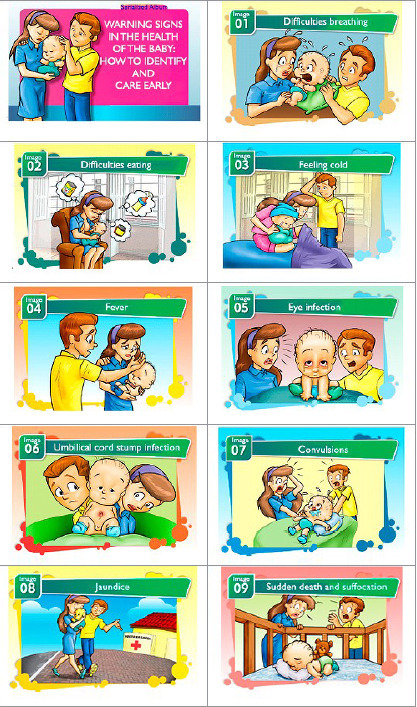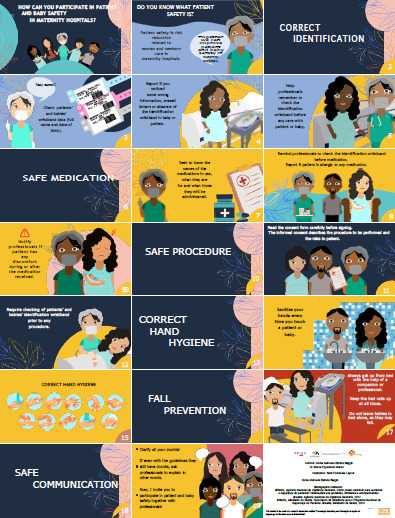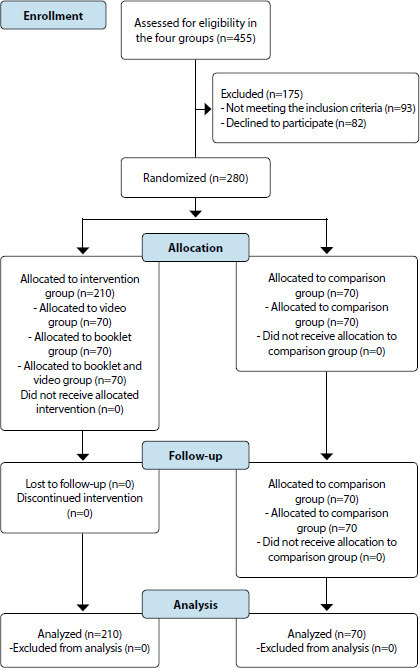-
ORIGINAL ARTICLE09-26-2022
Educational technology for infants’ families to identify warning signs: a validation study
Revista Brasileira de Enfermagem. 2022;75(5):e20210964
Abstract
ORIGINAL ARTICLEEducational technology for infants’ families to identify warning signs: a validation study
Revista Brasileira de Enfermagem. 2022;75(5):e20210964
DOI 10.1590/0034-7167-2021-0964
Views0See moreABSTRACT
Objective:
To validate, with the target audience, the usability and appearance of a serialized album about the warning signs to the health of children below 2 months.
Method:
Methodological validation study with the target population of an educational material in the form of a serialized album. 11 mothers with children under 2 months of age participated. The domains evaluated were: Objectives, Organization, Writing Style, Appearance, and Motivation. Data were analyzed using descriptive and statistics, and the data agreement index was calculated.
Results:
The global data agreement index was high (0.99). Mothers had positive responses, recognizing the excellence of the material: attractive figures that were easy to understand.
Conclusion:
The validation of the serialized album provides mothers with the abilities and knowledge they need to identify warning signs in regard to the health of their children, providing them with autonomy, corresponsibility, and helping them develop better child health practices.

-
ORIGINAL ARTICLE09-26-2022
Participatory development of educational technology in seeking patient safety in maternity hospitals
Revista Brasileira de Enfermagem. 2022;75(5):e20210701
Abstract
ORIGINAL ARTICLEParticipatory development of educational technology in seeking patient safety in maternity hospitals
Revista Brasileira de Enfermagem. 2022;75(5):e20210701
DOI 10.1590/0034-7167-2021-0701
Views1See moreABSTRACT
Objectives:
to develop a booklet as an educational technology, together with health professionals, patients and companions, aiming at their involvement in patient safety in maternity hospitals.
Methods:
a qualitative convergent care study, carried out in three stages at a maternity hospital in Belo Horizonte. The booklet construction took place between February and April 2021, with 13 professionals, 06 companions and 11 patients.
Results:
data content analysis was performed, creating three categories: Knowledge and experiences about patient and newborn safety in maternity hospitals; Challenges for involving patient and companion in safety actions; Assessment of patients, companions and professionals on the booklet construction process. The booklet construction involved the participation of health professionals, users and companions in all stages of the process.
Final considerations:
the participatory process enabled the creation of educational technology for the involvement of patients and companions in patient safety actions.

-
09-26-2022
Efeitos das tecnologias educacionais sobre a auto-eficácia materna na prevenção da diarreia infantil: um ensaio clínico
Revista Brasileira de Enfermagem. 2022;75(5):e20210339
Abstract
Efeitos das tecnologias educacionais sobre a auto-eficácia materna na prevenção da diarreia infantil: um ensaio clínico
Revista Brasileira de Enfermagem. 2022;75(5):e20210339
DOI 10.1590/0034-7167-2021-0339
Views1See moreRESUMEN
Objetivo:
evaluar el efecto de las intervenciones educativas sobre la autoeficacia materna en la prevención de la diarrea infantil en madres de niños menores de cinco años.
Métodos:
Ensayo clínico aleatorizado básico con 280 madres de niños menores de cinco años.
Resultados:
hubo un aumento estadísticamente significativo en los puntajes de autoeficacia materna después de la aplicación de las intervenciones. Hubo un aumento estadísticamente significativo en los puntajes de autoeficacia materna después de la aplicación del video (p= 0,026), folleto (p <0,001) y video y folleto (p <0,001).
Conclusión:
el uso combinado de video y folleto demostró ser más eficaz en la promoción de la autoeficacia que el uso aislado. Por lo tanto, se ha demostrado que las intervenciones utilizadas en este estudio aumentan significativamente la autoeficacia materna en la prevención de la diarrea infantil y, por lo tanto, pueden ser utilizadas por los profesionales de la salud como herramientas eficaces.
-
ORIGINAL ARTICLE09-26-2022
Effects of educational technologies on maternal self-efficacy in preventing childhood diarrhea: a clinical trial
Revista Brasileira de Enfermagem. 2022;75(5):e20210339
Abstract
ORIGINAL ARTICLEEffects of educational technologies on maternal self-efficacy in preventing childhood diarrhea: a clinical trial
Revista Brasileira de Enfermagem. 2022;75(5):e20210339
DOI 10.1590/0034-7167-2021-0339
Views0See moreABSTRACT
Objective:
To evaluate the effect of educational interventions on maternal self-efficacy in preventing childhood diarrhea in mothers of children younger than five years old.
Methods:
Basic randomized clinical trial involving 280 mothers of children under five years old.
Results:
There was a statistically significant increase in maternal self-efficacy scores after the application of the video (p= 0.026), booklet (p <0.001) and video and booklet (p <0.001).
Conclusion:
The combined use of video and booklet proved to be more effective in promoting self-efficacy than the isolated use. Thus, the interventions used in this study have been shown to significantly increase maternal self-efficacy in preventing childhood diarrhea and, therefore, can be used by health professionals as effective tools.

-
REVIEW09-26-2022
Eating self- efficacy in overweight and obese children and adolescents: integrative review of instruments
Revista Brasileira de Enfermagem. 2022;75(5):e20210301
Abstract
REVIEWEating self- efficacy in overweight and obese children and adolescents: integrative review of instruments
Revista Brasileira de Enfermagem. 2022;75(5):e20210301
DOI 10.1590/0034-7167-2021-0301
Views1See moreABSTRACT
Objective:
To describe the characteristics of instruments to assess eating self-efficacy in overweight and obesity in children and adolescents.
Methods:
Integrative literature review, conducted in May 2020, in six databases (PubMed; Web of Science; Scopus; CINAHL, ADOLEC, and PsycINFO) with the following search strategy: Self-efficacy and (Overweight OR Obesity) and (Child* OR Adolescent).
Results:
The inclusion of thirty-five articles and twenty-one instruments was applied to children 6 to 9 years old (n=2), adolescents 10 to 19 years old (n=9), and children and adolescents 7 to 18 years old (n=10). The instruments have 4 to 30 items and vary from two to five dimensions, the most frequent being “healthy eating” and “physical activity.”
Conclusion:
There are different reliable instruments designed to assess eating self-efficacy in adolescents and children, indicating the importance of this construct for preventing and controlling obesity and overweight.

-
TECHNOLOGICAL INNOVATION09-24-2022
Transitional care from the hospital to the home in heart failure: implementation of best practices
Revista Brasileira de Enfermagem. 2022;75(1):e20210123
Abstract
TECHNOLOGICAL INNOVATIONTransitional care from the hospital to the home in heart failure: implementation of best practices
Revista Brasileira de Enfermagem. 2022;75(1):e20210123
DOI 10.1590/0034-7167-2021-0123
Views0See moreABSTRACT
Objectives:
Assess the compliance of the implementation of better evidence in the transitional care of the person with heart failure from the hospital to the home.
Methods:
Evidence implementation project according to the JBI methodology in a cardiology hospital in São Paulo. Six criteria were audited before and after implementing strategies to increase compliance with best practices. 14 nurses and 22 patients participated in the audits.
Results:
In the baseline audit, compliance was null with five of the six criteria. Strategies: training of nurses; reformulation of the hospital discharge form and guidance on self-care in care contexts; and making telephone contact on the 7th, 14th and 21st days after discharge. In the follow-up audit, there was 100% compliance with five of the six criteria.
Conclusion:
The project made it possible to increase the compliance of transitional care practices in people with heart failure with the recommendations based on the best evidence.

-
ORIGINAL ARTICLE09-24-2022
Nurses’ performance in palliative care: spiritual care in the light of Theory of Human Caring
Revista Brasileira de Enfermagem. 2022;75(1):e20210029
Abstract
ORIGINAL ARTICLENurses’ performance in palliative care: spiritual care in the light of Theory of Human Caring
Revista Brasileira de Enfermagem. 2022;75(1):e20210029
DOI 10.1590/0034-7167-2021-0029
Views1See moreABSTRACT
Objectives:
to analyze nurses’ role in assisting patients in palliative care, with emphasis on the spiritual dimension, in the light of Theory of Human Caring.
Methods:
this is an exploratory, qualitative study, carried out in a hospital in João Pessoa, Paraíba, between August and December 2019, with 10 nurses. For data collection, semi-structured interviews were used. For analysis, we opted for content analysis.
Results:
the spiritual dimension of care is contemplated by several religious and spiritual practices. These are respected and encouraged by nurses, although there is difficulty in providing care for the spiritual dimension.
Final Considerations:
nurses have attitudes consistent with Jean Watson’s Theory and apply the Caritas Process elements during assistance to patients’ spiritual dimension in palliative care.
-
ORIGINAL ARTICLE09-24-2022
Patient safety in nursing technician training
Revista Brasileira de Enfermagem. 2022;75(1):e20201364
Abstract
ORIGINAL ARTICLEPatient safety in nursing technician training
Revista Brasileira de Enfermagem. 2022;75(1):e20201364
DOI 10.1590/0034-7167-2020-1364
Views0See moreABSTRACT
Objectives:
to analyze the contents on patient safety in the training of nursing technicians.
Methods:
a documentary study, conducted in three technical nursing courses at a public university in northeastern Brazil, based on the Multi-Professional Patient Safety Curriculum Guide, published by the World Health Organization.
Results:
we found that, of the 26 subjects in each course, the tracking terms were found in 22 subjects in the A/C courses, 23 in the B course. The topics of the guide with the highest number of terms were the improvement in medication safety, with 85 terms (22.6%), and Infection prevention and control, with 75 terms (20%). The contents do not express the comprehensiveness of patient safety education; some subjects had this focus, while others did not.
Conclusions:
the documents revealed gaps in the contents related to patient safety and demonstrated that they are addressed only in the course syllabus and discipline plans.
-
ORIGINAL ARTICLE09-29-2022
Relationship between family functionality and the quality of life of the elderly
Revista Brasileira de Enfermagem. 2022;75(2):e20210106
Abstract
ORIGINAL ARTICLERelationship between family functionality and the quality of life of the elderly
Revista Brasileira de Enfermagem. 2022;75(2):e20210106
DOI 10.1590/0034-7167-2021-0106
Views0See moreABSTRACT
Objective:
To analyze the correlation between family functionality and the quality of life of the elderly.
Method:
Sectional and correlational study conducted with 692 Brazilian elderly between July and October 2020. The elderly filled three instruments: biosociodemographic, family APGAR and WHOQOL-Old. The tests Kruskal-Wallis, Pearson correlation, and linear regression analyzed the data. The study considered a 95% confidence interval (p < 0.05) for all analyses.
Results:
The elderly with mild and severe family dysfunction presented worse quality of life when compared to the elderly with a functional family. All facets of quality of life correlated positively with family functionality.
Conclusion:
Family functionality is positively correlated with the quality of life of the elderly, therefore requiring the inclusion of the family in health care plans to identify potential family stressors early and plan interventions to solve the problems raised.
-
ORIGINAL ARTICLE06-24-2020
Serious Game e-Baby Família: an educational technology for premature infant care
Revista Brasileira de Enfermagem. 2020;73(4):e20190116
Abstract
ORIGINAL ARTICLESerious Game e-Baby Família: an educational technology for premature infant care
Revista Brasileira de Enfermagem. 2020;73(4):e20190116
DOI 10.1590/0034-7167-2019-0116
Views0See moreABSTRACT
Objectives:
to develop and assess the serious game e-Baby Família with parents of premature infants.
Methods:
a methodological study regarding the development of the serious game, with participatory design in scope definition, starting from parents’ learning needs about premature infant care. A qualitative approach was performed in the assessment stage with parents, with content analysis of the speech of the eight participants.
Results:
the following categories emerged: Realistic appearance of the virtual setting and game content and Gameplay implications for the use of e-Baby Família. The game was satisfactorily assessed regarding content, appearance and dynamics use, motivating participants to learn.
Final Considerations:
in the context of prematurity as a public health problem in Brazil and the need to strengthen family health education for care, the serious game was assessed as motivating and appropriate for health learning.

-
ORIGINAL ARTICLE12-13-2019
Prenatal follow-up of high-risk pregnancy in the public service
Revista Brasileira de Enfermagem. 2019;72:204-211
Abstract
ORIGINAL ARTICLEPrenatal follow-up of high-risk pregnancy in the public service
Revista Brasileira de Enfermagem. 2019;72:204-211
DOI 10.1590/0034-7167-2018-0425
Views0See moreABSTRACT
Objective:
to analyze the prenatal follow-up of high-risk pregnancy in the public service.
Method:
an analytical cross-sectional study carried out in a public maternity hospital in the South of Brazil, during the hospitalization of 319 postpartum women using a semi-structured tool for transcription of the prenatal card records and interview. The data were analyzed using the Chi-Square test (p≤0.05).
Results:
the adequacy of prenatal care was high (74%); 22.6% intermediate; 3.4% inefficient. Prenatal care had high coverage (100%), early onset (81.5%) and six or more visits (92.4%), but (77.4%) did not receive information about gestational disease and examinations (69.3%). There was statistical significance between the quality of prenatal care and the place of prenatal care (p=0.005).
Conclusion:
the need to implement a specific protocol for high-risk gestation and continuous education to the teams was evidenced.

-
ORIGINAL ARTICLE12-05-2019
Aging, sexuality and nursing care: the elderly woman’s look
Revista Brasileira de Enfermagem. 2019;72:71-78
Abstract
ORIGINAL ARTICLEAging, sexuality and nursing care: the elderly woman’s look
Revista Brasileira de Enfermagem. 2019;72:71-78
DOI 10.1590/0034-7167-2018-0015
Views0See moreABSTRACT
Objective:
to analyze the perception of elderly women about sexuality and practice of nursing care in this context.
Method:
a descriptive qualitative study. Fifty elderly women from Guanambi City – Bahia State were interviewed in 2016. Data collection technique was direct interview by using an unstructured script. Analysis of the semantic content described was carried out, and two empirical categories: the elderly woman’s view of nursing care in the promotion of sexual health and experience of sexuality in the elderly; and nursing care in the context of women’s aging.
Results:
it has been noted that the elderly women are afraid to talk about sexuality, especially with health professionals. By influences of society, they often exclude this issue of health care for elderly women.
Final considerations:
changes must be thought about assistance provided in relation to sexuality.
-
03-15-2021
Effectiveness of mobile applications in pregnant women’s adherence to prenatal consultations: randomized clinical trial
Revista Brasileira de Enfermagem. 2021;74:e20190599
Abstract
Effectiveness of mobile applications in pregnant women’s adherence to prenatal consultations: randomized clinical trial
Revista Brasileira de Enfermagem. 2021;74:e20190599
DOI 10.1590/0034-7167-2019-0599
Views0See moreABSTRACT
Objective:
to evaluate the effectiveness of a mobile application for cell phones in the adherence of pregnant women to prenatal consultations.
Method:
a randomized controlled clinical trial, simple-blind with two parallel groups, conducted from January to December 2018. Data collection was carried out through a structured interview at the end of the third trimester of pregnancy. For analysis, Chi-Square and Mann-Whitney tests were used. The sample consisted of 88 pregnant women from 2 Family Health Strategies in Northeast Brazil. Participants were randomized into two groups: intervention (IG), who used the application, and control (CG), who attended prenatal consultations.
Results:
pregnant women who used the application (IG) attended a greater number of consultations when compared to participants in the CG, identifying a statistical difference between the groups (p<0.05).
Conclusion:
the application showed to be an effective health technology to improve adherence to prenatal care. Brazilian Registry of Clinical Trials: RBR-74SNST.

-
06-01-2020
Mental Health: Focusing On Health Professionals
Revista Brasileira de Enfermagem. 2020;73:e73supl01
Abstract
Mental Health: Focusing On Health Professionals
Revista Brasileira de Enfermagem. 2020;73:e73supl01
DOI 10.1590/0034-7167.202073supl01
Views0Mental health is an inseparable part of our health, and health-related themes have been calling the attention of population, institutions, and managers, especially in our current setting with the COVID-19 pandemic. The daily life of care practice of health professionals is full of concern, uncertainty, tension, and anguish. They have been susceptible to psychological distress […]See more -
REFLECTION09-07-2020
Patient-and Family-Centered Care and Patient Safety: reflections upon emerging proximity
Revista Brasileira de Enfermagem. 2020;73(6):e20190672
Abstract
REFLECTIONPatient-and Family-Centered Care and Patient Safety: reflections upon emerging proximity
Revista Brasileira de Enfermagem. 2020;73(6):e20190672
DOI 10.1590/0034-7167-2019-0672
Views0See moreABSTRACT
Objective:
To present reflections upon conceptual and pragmatic relationships between the Patient-and Family-Centered Care and patient safety.
Method:
A discussion about constructs related to the Patient-and Family-Centered Care and patient safety, which shows their interface with pragmatic issues of clinical nursing practice.
Results:
Considering patients and families as partners and agents promoting safe care is mandatory for the safety culture.
Final considerations:
Decreasing errors and adverse health care events can be accomplished by understanding manners to incorporate the principles of Patient-and Family-Centered Care into issues related to patient safety.
-
ORIGINAL ARTICLE12-05-2019
Construction and validation of a sleep hygiene booklet for the elderly
Revista Brasileira de Enfermagem. 2019;72:214-220
Abstract
ORIGINAL ARTICLEConstruction and validation of a sleep hygiene booklet for the elderly
Revista Brasileira de Enfermagem. 2019;72:214-220
DOI 10.1590/0034-7167-2018-0603
Views0See moreABSTRACT
Objective:
to construct and validate an educational booklet for the elderly, with guidelines on sleep hygiene.
Method:
a methodological research with booklet construction; validation by 22 judges and evaluation by 22 elderly people. The content was extracted from the guidelines of the Brazilian Sleep Association and the elderly health manual of the Human Rights Office. The item with Content Validity Index (CVI) greater than 0.8 or whose concordance ratio verified with the Binomial Test was valid and statistically equal to or greater than 80%.
Results:
the booklet presented 14 guidelines for the elderly about sleep hygiene distributed over 25 pages. All items were evaluated as relevant. The CVI had an average of 0.95 by the judges and 0.95 by the elderly.
Conclusion:
the booklet was constructed and validated as to its content and appearance. It can be used by health professionals in the various services with the elderly.

Search
Search in:
Nuvem de Tags
Adolescente (85) Atenção Primária à Saúde (239) COVID-19 (91) Criança (91) Cuidados de Enfermagem (269) Educação em Enfermagem (151) Educação em Saúde (139) Enfermagem (930) Enfermagem Pediátrica (86) Estudantes de Enfermagem (77) Estudos de Validação (131) Família (87) Idoso (208) Promoção da Saúde (99) Qualidade de Vida (104) Saúde do Trabalhador (86) Saúde Mental (145) Saúde Pública (82) Segurança do Paciente (150) Tecnologia Educacional (100)



